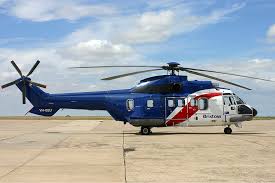
The operations of Bristow Helicopters (Nigeria) Limited may be threatened as its parent company, Bristow Group Inc. in the United States faced the option of bankruptcy in the failure to meet its financial obligation under a given period.
Reports from the United States Security and Exchange Commission (NASDAQ) SEC filing indicated that Bristow has exercised its right to a 30 day grace period to make a $12.5m interest payment and the company has until May 15, 2019 to make this payment or declare for Chapter 11, which is bankruptcy.
Industry observers in Nigeria say that this may affect its business in the country, as oil and gas operators may not extend contracts to the aviation logistics company, which has been operating in Nigeria for decades.
There are fears that this may jolt the oil and gas shuttle service sub-sector as experience has shown that Exploration and Production companies are sensitive and weary about extending contracts to organisations under financial straights.
Until recently Bristow held over 60 per cent of the market share in the oil and gas logistics, some indigenous organisations have eroded the market share but Bristow still has substantial contracts that are yet to terminate.
Bristow Group Inc. in a letter to SEC said, “We may not be successful in complying with the covenants contained in our debt instruments and lease agreements, and any such failure to comply could result in defaults under such commitments. If we are unable to obtain waivers of any such defaults, we could be required to repay our debt obligations or contractual commitments earlier than anticipated, and there is no assurance that we would have sufficient cash available to fund such payments.”
Hinting on possible bankruptcy, the company further said, “We have engaged financial and legal advisors to assist us in, among other things, analysing various strategic financial alternatives to address our liquidity and capital structure, including strategic financial alternatives to restructure our indebtedness. We and certain of our subsidiaries may elect to implement such a transaction through Chapter 11 of the United States Bankruptcy Code (“Chapter 11”) in order to obtain court approval of such transactions and to facilitate the stakeholder approvals necessary to implement such transactions.”
Allaying fears of its effect in Bristow Nigeria operations, the Bristow Senior Business Development Manager, Mayowa Babatunde, told THISDAY that the issues concerning Bristow parent company in the US would have zero impact in the operations of Bristow (Nigeria) Limited.
“It will not affect our operations here. Measures have been put in place to address those issues. From the operational standpoint we are operating normally,” Babatunde said.
But industry insiders are of the view that Bristow may not be able to secure more contracts if its parent company is declared bankrupt.
“When Canada Helicopter Company (CHC) left Nigeria by severing its partnership with Aero Contractors, its activities in the country diminished, even when it teamed up with Jegal Group to form Atlantic Aviation. When it declared Chapter 11, its business closed in Nigeria. So my thinking is that Bristow will wrap up its operations under force majure and they wont go into a new contract. Currently the have a lot of contracts but only one new one,” the source told THISDAY.
THISDAY investigations also disclosed that Bristow had directed its suppliers to send their invoices to KPMG, although Bristow officials denied being aware of that.
But when asked about the directive, Bristow kept mum; however, THISDAY learnt that the directive was not unconnected with the latest development in the company.
Exploration and Production companies are said to be very sensitive about contracting logistics companies because of inherent dangers of failure, which could result to accidents, so they ensure that the logistics organisations have the right equipment, the skilled manpower and are also financially robust.
THISDAY






